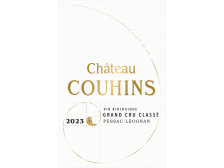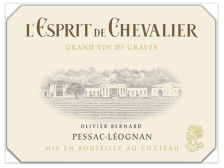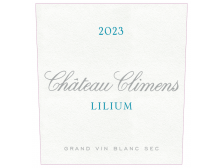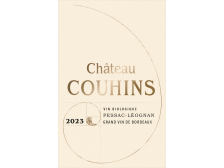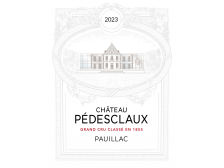2024 Futures
The label « bio » indicates wines from biological viticulture or viniculture, subject to the official certification after the bottling.
-
This classified growth, owned by INRA, has grown considerably since the Institute's researchers decided to apply the results of their most advanced research to it, and the arrival of Mr Derenoncourt as an advisor. In a rather lively and tense style, Couhins is today by its price the best deal among the white classified growths of Pessac-Léognan.
More- To keep or to drink:
- Available early 2027
- Organic certification:
- 2022
-
Built on freshness and tension, Esprit de Chevalier distinguishes itself from the appellation's other second wines by its extra smoothness and remarkable aromatic richness (green mango, citrus fruit, white peach...). The development of a third wine is undoubtedly no stranger to this.
More- To keep or to drink:
- Available early 2027
- Organic certification:
- 2023
-
Like many Sauternes crus, Climens has been producing a confidential 100% Semillon cuvée since 2022. Thanks to precision work during pressing and ageing in glass globes, Lilium expresses with a great purity the aromatic richness of this emblematic Sauternes grape variety, in a great gourmet white wine with a silky texture.
More- To keep or to drink:
- Available early 2027
- Potential alcohol:
- 12.5%
- Organic certification:
- 2022
-
In white, Domaine de Chevalier produces a model unique among its peers, made of tension, vivacity and energy. Its mineral side and its capacity to age (30 years and more) bring it closer to the greatest Burgundy whites.
More- To keep or to drink:
- Available early 2027
- Potential alcohol:
- 14%
- Organic certification:
- 2023
-
Smith Haut Lafitte's white wine has built up a solid reputation over the past 20 years, even though it is not a grand cru classé (but neither are Haut-Brion blanc and Pape-Clément blanc). A happy marriage of wood and fruit, it always delivers a beautiful aromatic complexity, from lime blossom to citrus fruit, and a lively, rich, fine structure.
More- To keep or to drink:
- Available early 2027
- Organic certification:
- 2019
-
The only 1er cru classé in the commune of Sauternes with Yquem, Guiraud offers rich, voluminous, powerful wines with a formal classicism. Certified organic since the 2011 vintage.
J-M Quarin: 96/100 "Light yellow colour with green highlights. Intense, fine, subtle, noble and complex nose. Ultra meticulous on the palate, with great class in the touch and lots and lots of taste, the wine melts on the palate all at once delicate, delicious, noble and deep. Incredibly long aftertaste." (April 2025)
More- To keep or to drink:
- Available early 2027
- Organic certification:
- 2011
-
Climens has been, for more than 50 years, the finest, the fruitiest and the most endearing of the Sauternes wines. Almost discreet in its first youth, Climens does not cease to develop and to refine itself in bottle. Biodynamic since the 2014 vintage. Magnificent 2016 "a fruit of an exemplary purity" noted 99/100 by the Revue du Vin de France.
Following 4 years of almost no production (none in 2017, 2018 and 2020, barely 1200 bottles in 2019), Climens changed hands in 2022.More- To keep or to drink:
- Available early 2027
- Potential alcohol:
- 13.5%
- Organic certification:
- 2016
-
Mrs Papon-Nouvel is known for her 2 wonderful Saint-Émilion wines: Clos Saint-Julien and Petit-Gravet Aîné. But it also owns Peyrou, a small vineyard (10 ha) of the Côtes de Castillon in organic farming. Excellent and highly recommended.
More- To keep or to drink:
- Available early 2027
- Organic certification:
- 2011
-
A 4 ha plot selection from Château Rigaud, La Mauriane is not yet another luxurious cuvée on the right bank but a wine built on fine grain tannins where the brilliance and precision of the fruit prevail. A true gem in the right bank !
More- To keep or to drink:
- Available early 2027
- Organic certification:
- 2012
-
Certified organic since 2015 and with a vineyard that is entirely biodynamic, Château de La Dauphine aims, beyond its 350 years of history, to set an example of modern winegrowing that is mindful of environmental issues. The wines, with more finesse than extraction, lack neither substance nor charm. "La Dauphine is clearly one of Fronsac's benchmarks," says Mr Galloni.
More- To keep or to drink:
- Available early 2027
- Potential alcohol:
- 14.5%
- Organic certification:
- 2015
-
Started in 2003, the Clos Louie adventure is a textbook case: a dolly vineyard (2.3 ha) on a beautiful clay-limestone terroir of Castillon, careful biodynamic cultivation, double manual sorting during the harvest, low-intervention vinification, gentle maturation in 500-litre demi-muids.
Louison et Léopoldine is the other Clos Louie wine, a tribute to Cabernet Franc (80%) from 50-year-old vines. Clean, bright fruit and remarkable aromatic freshness: a real nugget!More- To keep or to drink:
- Available early 2027
- Organic certification:
- 2012
-
With 12 hectares cultivated in biodynamic farming, certified since the 2007 vintage, Clos Puy-Arnaud is one of the great Côtes de Castillon wines that have nothing to envy to neighbouring Saint-Émilion.
Uncompromising, the great wine that has made the estate's reputation is an authentic cuvée, straightforward, deep and made for laying down.More- To keep or to drink:
- Available early 2027
- Potential alcohol:
- 14%
- Organic certification:
- 2009
-
Started in 2003, the adventure of Clos Louie is a textbook case: doll's vineyard (2.3 ha) on a beautiful clay-limestone terroir of Castillon, very old vines (150 years old!) mostly Merlot and red tail malbec, careful biodynamic cultivation, double manual sorting during the harvest, little interventionist vinification, gentle maturing in 500-litre demi-muids. A true artist's wine, absent from the guides but that informed amateurs know well.
More- To keep or to drink:
- Available early 2027
- Organic certification:
- 2012
-
Couhins' clear progress, seen in white wine since 2009, is now being felt in red wine. Here, it is not power that is sought but balance, aromatic delicacy and palatability.
More- To keep or to drink:
- Available early 2027
- Organic certification:
- 2022
-
A family estate reawakened in 2011 by the arrival of son Paul Garcin, a former rock musician on the Bordeaux scene. An instant switch to organic and biodynamic viticulture, to produce intuitive, artist's wines that are immediately sapid and have a strong pleasure note. As a deliberate iconoclast, Paul Garcin makes a point of offering different facets to each Haut-Bergey vintage: a classic cuvée vinified and matured in the tradition of Bordeaux's great growths, the more contemporary Cuvée Paul, and single-vineyard cuvées highlighting their respective terroirs.
An approach hailed by the Revue du Vin de France: "A modern vision and the ability to reinvent oneself without betraying: Haut-Bergey symbolises the current vitality of Bordeaux's most historic vineyard".More- To keep or to drink:
- Available early 2027
- Potential alcohol:
- 13.5%
- Organic certification:
- 2015
-
Practically abandoned in 1993 when Mr. and Mrs. Cathiard bought it, Smith Haut Lafitte is today one of the 10 greatest vintages of the Bordeaux left bank. The road they have travelled is truly admirable, and the Cathiards have spared no effort: restoration of the vineyard, construction of a vat room and underground cellar, introduction of state-of-the-art equipment, conversion to organic viticulture...
More- To keep or to drink:
- Available early 2027
- Organic certification:
- 2019
-
Totally surrounded by classified growths, La Gurgue enjoys a privileged terroir, and the attentive care of Mrs Villars (also owner of Ferrière, classified growth of Margaux, and Haut-Bages-Libéral, classified growth of Pauillac), voted Winemaker of the Year 2024 by La Revue du Vin de France. Certainly the best quality/price/pleasure ratio in the appellation.
More- To keep or to drink:
- Available early 2027
- Organic certification:
- 2015
-
A small Margaux classified growth (24 ha), Ferrière is a traditional Margaux, frank and pleasant, moderately powerful but perfectly balanced. Its capacity for ageing is undeniable. Certified organicsince 2015, Ferrière was doubly certified biodynamic in 2018, with the Biodyvin and Demeter labels. Awarded Best Winemaker of the Year 2024 by Revue du Vin de France, Claire Villars-Lurtonet has pushed her Margaux cru to the top. Bravo!
More- To keep or to drink:
- Available early 2027
- Organic certification:
- 2015
-
In organic conversion from 2013, Durfort-Vivens was one of the very first classified growths in the Médoc to claim and display organic certification from 2016. M. Bettane is one of its most fervent defenders: "the quality/price ratio remains absolutely unique at this level of quality of terroir and work.
More- To keep or to drink:
- Available early 2027
- Organic certification:
- 2016
-
Palmer, a Cru apart from the Margaux, delivers an original interpretation of the appellation with wines that are always charming, melting and voluptuous, which explains its 50% Merlot grape variety.
More- To keep or to drink:
- Available early 2027
- Organic certification:
- 2018
-
Second wine of Gruaud-Larose. In a rather powerful and tight register, Sarget is a serious and convincing Saint-Julien, with substance, at its best after 5 to 7 years of ageing.
More- To keep or to drink:
- Available early 2027
- Potential alcohol:
- 12.5%
- Organic certification:
- 2022
-
Of all the second classified growths in St-Julien, Gruaud-Larose is the most vigorous and massive in young wine. But, the magic of the terroir, it acquires softness and finesse if it is given time to age. Its quality/price ratio puts it ahead of the other second classified growths of St-Julien!
More- To keep or to drink:
- Available early 2027
- Potential alcohol:
- 12.5%
- Organic certification:
- 2022
-
Since 2009 and the acquisition by Mr. Lorenzetti, we can talk about a new vintage wine classified in Pauillac. Unworthy of his ranking, Pédesclaux had until then disappeared from the Bordeaux scene. The ambition and resources of the new owner are there: complete overhaul of the installations, acquisition of new plots of land ideally located. The first vintages offer the image of a supple and easily accessible Pauillac, at a price that defies all competition in the appellation.
More- To keep or to drink:
- Available early 2027
- Organic certification:
- 2022
-
Since 2010, Claire Villars (also at Ferrière and La Gurgue), puts back in the saddle Haut-Bages Liberal. With a qualitative terroir (adjacent to Latour), this certified organic wine since 2019 has become, for a reasonable price, the good deal of Pauillac.
More- To keep or to drink:
- Available early 2027
- Potential alcohol:
- 13.5%
- Organic certification:
- 2019
-
Contiguous to Mouton-Rothschild, Pontet-Canet is in good vintages the very type of great Pauillac, straight and racy. The first of the Grands Crus Classés to be certified "organic" (in 2010), Pontet-Canet has been at the top of the Médoc since 2000.
More- To keep or to drink:
- Available early 2027
- Blend:
- Cabernet Sauvignon 52% Merlot 43% Petit Verdot 4% Cabernet Franc 1%
- Organic certification:
- 2010
-
As its name indicates, Bellegrave is on the crown of alluvial gravel of the Isle. With application, Mr. Bouldy has been offering for 40 years a true artisanal Pomerol, fresh, with velvety, energetic tannins and excellent keeping qualities.
More- To keep or to drink:
- Available early 2027
- Organic certification:
- 2012
-
This beautiful 24-hectare estate has been run by Alain Moueix since 1992. He applies the same philosophy and methods as at Fonroque (Saint-Émilion): organic farming since 2015, biodynamic certification in 2018, search for freshness and elegance through controlled extractions... Mazeyres offers delicate and measured wines, without blush, with a great finesse of flavor that increases even more in recent vintages.
More- To keep or to drink:
- Available early 2027
- Potential alcohol:
- 14.5%
- Organic certification:
- 2015
-
The terraces of Moulin Saint-Georges (7 ha) face those of Ausone (same owner). Thanks to the quality of its terroir and the refined style of its wines, Moulin Saint-Georges is a sure bet in the appellation. As the Revue du Vin de France's 2024 guide points out, "quality has been impressively consistent for over two decades, and prices remain reasonable. The only regret is the quantities available...".
Like all Vauthier vineyards (Ausone, La Clotte, Haut-Simard...), Moulin Saint-Georges began its conversion to organic farming in 2020.More- To keep or to drink:
- Available early 2027
- Organic certification:
- 2023
-
As well maintained as Canon-La Gaffelière (same owner), under the direction of Mr. Derenoncourt, Clos de l'Oratoire offers practically the same fullness and intensity for half the price.
More- To keep or to drink:
- Available early 2027
- Organic certification:
- 2020
-
An oenologist by training, Ms. Papon-Nouvel owns two tiny properties at the bottom of Saint-Émilion near Canon-La Gaffelière: Petit Gravet Aîné (2.4 ha) and Clos Saint-Julien (1.3 ha), where the vines are mainly old cabernets francs. From the vine to the cellar, she manages all the stages in the production of her wines on her own and, whatever the vintage, her talent as an instinctive winemaker gives wines of natural elegance and exemplary sweetness.
More- To keep or to drink:
- Available early 2027
- Organic certification:
- 2011


